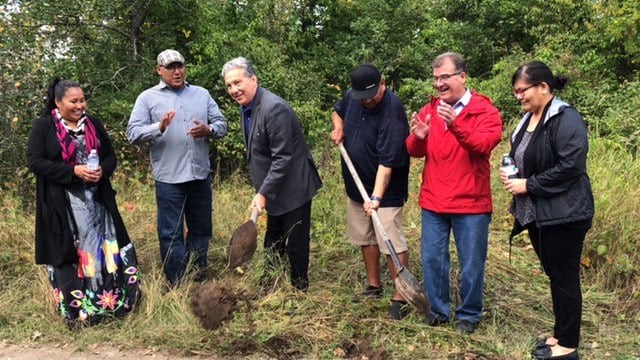Ahead of a federal election, Ottawa was rolling out funding and breaking ground on First Nation community infrastructure projects across Northern Ontario.
Nipissing First Nation, west of North Bay, received $3.3 million to build a new road between the on-reserve communities of Yellek and Duchesnay.
The construction involves building a 2.1-kilometre paved road with shoulders, walkways and culverts.
Local MP Anthony Rota said on Sept.6 that the road gives members "better access to critical services" and will improve community safety.
The province is chipping in $808,650 for the project while Nipissing First Nation is contributing $294,225.
"In 2015, our citizens identified this linkage as a priority to address safety concerns stemming from both communities having only one access point," said Chief Scott McLeod in a press release.
"This critical new infrastructure will also open up land for development and lead to more centralized services to improve quality of life for our citizens."
Want to read more stories about business in the North? Subscribe to our newsletter.
In the northwest, Kenora MP Bob Nault announced $1.4 million for the design phase of the much-anticipated Beren River Bridge to increase access to seven remote First Nation communities.
The communities involved are Deer Lake, Keewaywin, McDowell Lake, North Spirit Lake, Pikangikum, Poplar Hill and Sandy Lake, all home to 8,100 people.
Access to these places is currently limited to winter, aircraft and barge.
The project involves the design of a bridge across the Berens River, the extension of a permanent road, and the realignment of the winter road.
"We are all hoping the bridge comes sooner rather than later, as this is an item that's been talked about for over 10 years," said Sandy Lake Chief Delores Kakegamic on Sept. 5.
"The Berens River Bridge provides an important connection for First Nations communities in the North, which will provide them with improved access to essential services, such as health care, mental health services, and social programming," said Nault in a statement.
"This connection will also provide new economic opportunities for these communities, which will help with resource development and business creation, among other things. This is an important step to open up and bring prosperity to the North for everyone."
The government news shifted to Shoal Lake 40 for the groundbreaking to signal the start of construction of a water treatment and distribution plant, which will put an end to a chronic drinking water problem experienced by the 292 on-reserve residents since 1997.
The successful bidder chosen was a joint venture firm, Shoal Lake 40 Contractors LP/Sigfusson Northern Ltd.
The feds are contributing up to $33 million for the project, which involves a new water treatment plant, reservoir, raw water intake structure and lift station, installation of water main connections and some fire hydrants. Construction is expected to be complete by December 2020.
Shoal Lake 40 straddles the Ontario-Manitoba border 55 kilometres west of Kenora and a short distance south of the Trans-Canada Highway.
Freedom Road, which opened June 3, provides residents with year-round access to the highway.
Until the recent completion of Freedom Road, Shoal Lake 40's access to the mainland was cut off for 100 years by Winnipeg's water infrastructure located on their reserve.
The community's water system currently consists of a network of 12 pump houses which do not adequately treat water to applicable standards.
"Building on the success of Freedom Road, the awarding of the construction contract for our new water treatment system continues our work with willing partners to correct past wrongs in the spirit of reconciliation," said Chief Erwin Redsky.
"After decades of denial, our people can finally look forward to the day when we, like the citizens of Winnipeg, can turn on our taps and access clean, safe Shoal Lake water."




